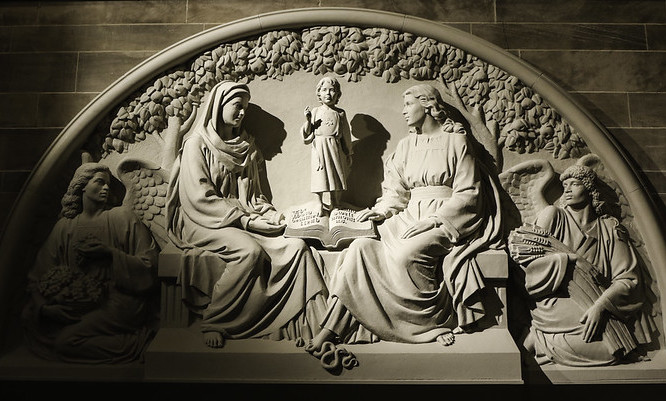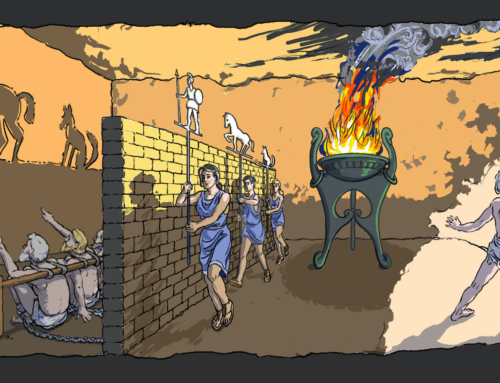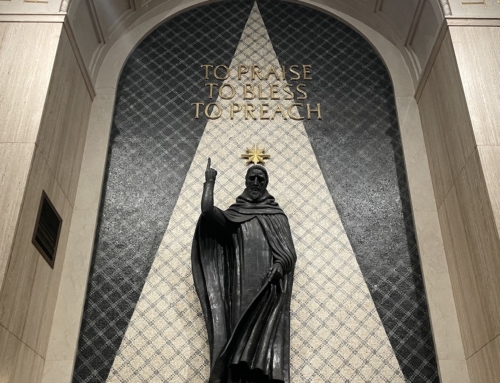Note from the Editor: The Dominicana blog is reducing its number of posts each week. Going forward we will be publishing only on Monday, Wednesday, and Friday. We hope to continue to produce quality articles on theological and spiritual matters, just on a slightly reduced scale. We thank you for your readership and assure you of our prayers!
When we’re accustomed to something, we often don’t give it the reflection it deserves. For instance, the fact that one person can make another person know what he is thinking by making noises—through language—is an incredibly complex and beautiful reality, but our constant use of language every waking hour makes this fact easy to gloss over. Similarly, the historically deep saturation of Christianity into our culture—despite our culture becoming increasingly ‘post-Christian’—can cause us to mistake the profoundest realities of our faith as commonplace. This is also true about what we hear in the first reading of today’s Mass. That God has spoken to us through the Son is repeated so frequently that oftentimes we miss its depth.
On the one hand, it’s good to be accustomed to the extraordinary. For example, it’s a bad idea for someone to gawk at the marvel of human language when making an emergency call. Similarly, a sacristan doing work in the sanctuary will genuflect and acknowledge the Blessed Sacrament, but his mind will inevitably settle on the various tasks he has to accomplish in order for that space to be suitable for worship and prayer.
On the other hand, one needs to contemplate the extraordinary in order to be happy. Marveling from time to time at the beauty of human language, for instance, helps one to see the dignity of every human being. It also helps one see the importance of using language correctly and speaking well. If one of the uses of language is to share yourself with somebody else, using language more precisely, accurately, and effectively enables you to share more of yourself with another. Marveling at how language brings people closer can lead us to use it more effectively, which can bring us closer to other people in our lives and by doing so make us happier.
In a similar way, Pope St. Leo the Great reminds us in a famous sermon how extraordinary it is to be a Christian:
Christian, acknowledge your dignity, and becoming a partner in the Divine nature, refuse to return to the old baseness by degenerate conduct. Remember the Head and the Body of which you are a member. Recollect that you were rescued from the power of darkness and brought out into God’s light and kingdom. By the mystery of baptism you were made the temple of the Holy Ghost: do not put such a denizen to flight from you by base acts, and subject yourself once more to the devil’s thralldom: because your purchase money is the blood of Christ, because He shall judge you in truth Who ransomed you in mercy. (Sermon 21)
St. Leo’s reasoning is clear. You might bet ten dollars to win another ten, but you would never wager your life savings for ten dollars. Likewise, if you recall from time to time what you were created to be, who it was who redeemed you, how he redeemed you, and “the Head and the Body of which you are a member,” it becomes more difficult to give up that dignity in favor of something base.
Following St. Leo’s exhortation, we can take today’s reading from Hebrews as prompting us to ponder once again what God has done for us through Christ and who we are because of this. Not only has God spoken to us, but he has spoken to us through the Son:
whom he made heir of all things and through whom he created the universe, who is the refulgence of his glory, the very imprint of his being, and who sustains all things by his mighty word. When he had accomplished purification from sins, he took his seat at the right hand of the Majesty on high, as far superior to the angels as the name he has inherited is more excellent than theirs. (Heb 1:2–4)
As Christians, we have heard this reading and its message over and over again, but this mustn’t mean that we fail to reflect once more on its content. Just like marveling from time to time about the marvel of human language might augment our happiness by helping us appreciate our dignity and use language more effectively, by marveling at who it is through whom God has spoken to us and by what price he has redeemed us, we can trust God will work through us to secure our eternal happiness. Like St. Leo reminds us, we will acknowledge the dignity Christ has won for us by making us “partners in the divine nature” and refuse to trade that for anything.
✠
Photo by Lawrence Lew, O.P. (used with permission)







